- You may be looking for the Netflix series or any number of other things by this name.
A Series of Unfortunate Events is the collective volume of the thirteen books following the unfortunate lives of the three extremely unlucky Baudelaire Orphans, as written by Lemony Snicket which is a pen name for Daniel Handler.
The books have been adapted in various ways, including audiobooks, a video game, a film, a TV series, etc.
Genre
| “ | Dear Reader, If you have just picked up this book, then it is not too late to put it back down. Like the previous books in A Series of Unfortunate Events, there is nothing to be found in these pages but misery, despair, and discomfort, and you still have time to choose something else to read. | ” |
— Lemony Snicket, The Ersatz Elevator
|
This series is most commonly classified as "children's" fiction, but it has also been classified as teen/young adult and having a quality that older adults can enjoy, similar to the Harry Potter series. There is a level of complexity in the series, such as the relations between characters and how it is all connected, as well as allusions to many pieces of literature that a young child would not grasp. A Series of Unfortunate Events could be seen as a parody of children's literature or psuedo-children's literature. For example, there is a lot of mature content and characters dying in horrible ways such as being buzzsawed to death or gored by lions, and Lemony Snicket is the type of who uses complicated language that even many adults don't know, such as "augmented", "furtive", "rivulets", "verdant", "accoutrement", etc. In addition, the child protagonists of the series are often portrayed as being intelligent and more mature and "adultish" than many of the actual adults in the series. Some of the humor in the series may also be lost on younger audiences; for example, in the TV series, Monty asks Stephano where he studied herpetology, and Stephano replies that he does not know anything about sores. This is a joke about herpes.
It may be considered mystery due to many mysterious themes and elements.
Some have classified it into specific genres such as gothic fiction, or some variety thereof, whether it is mock-gothic, a satire of gothic literature, neo-Victorian or "suburban gothic". There are also some slight steampunk elements.
Another genre that the series has been described as is absurdist fiction, because of its strange characters, improbable storylines, and black comedy due to the morbid nature of the series.
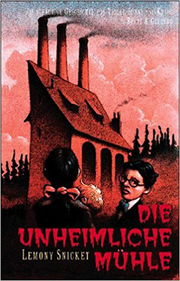
The German cover of The Miserable Mill resembles a horror novel.
Some have categorized the series as "horror" and "suspense", due to the amount of danger, death, violence, dread and tension in some of them.
The books often have a wonky and creepy existentialist vibe to them, exemplified by all the strangeness and oddities the Baudelaires encounter, giving them a surreal, unsettling, alien or otherworldly vibe. This can make the series feel like a strange dream or nightmare.
Characterized by Victorian Gothic tones and absurdist textuality, the books are noted for their dark humor, sarcastic storytelling, and anachronistic elements, as well as frequent cultural and literary allusions. They have been classified as postmodern and metafictional writing, with the plot evolution throughout the later novels being cited as an exploration of the psychological process of transition from the idyllic innocence of childhood to the moral complexity of maturity.
Plot
Setting
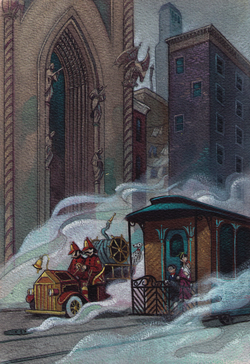
The Baudelaires in the city
A Series of Unfortunate Events is set in an anachronistic time period that is ambiguously set sometime in the 20th century, with old and new inventions used. A variety of inventions and technology are mentioned. For example, there are helicopters, phones, a microphone, and a supercomputer in a school. At another point, telegrams appear. This paints a very changing landscape of an industrial time, with technology not yet homogenized in all places in the series. In addition, the Baudelaire children are illustrated wearing very Victorian-era clothing.
This aspect is made even more absurd in the TV series, as Count Olaf mentions he bought an hourglass "online" (implying the Internet) and he prefers "streaming television in the comfort of his own home", a reference to Netflix. In The Miserable Mill: Part One, Pink Floyd – The Wall is mentioned, suggesting the series is not set before 1982.
The location is the series is unknown; three of the books (1, 6, 12) are set in an unspecified urban city. The Baudelaires visit a myriad of locations, such as a lakeside town, a boarding school, hinterlands, mountains, etc.
The ambiguity of both the time and the setting are likely intentional decisions by Daniel Handler, who when asked, said, "A Series of Unfortunate Events takes place in the city and regions surrounding it, during the week and sometimes on weekends. All The Wrong Questions takes place earlier, in a smaller town."
A Series of Unfortunate Events is also depicted as being full of diverse and multicultural mentions, from its locations, food, language and people. For example, Peru is mentioned in the second book, a Vietnamese restaurant is mentioned in the sixth, Hector may be of Hispanic descent as he cooks Mexican food in book seven, there is an Indian restaurant in book twelve, etc. Charles and Sir in book four are heavily implied to be a gay couple. There are mentions of rabbis throughout the series and different religions, traditions and culture. Handler also wanted a more ethnically diverse cast in the TV series.
Premise
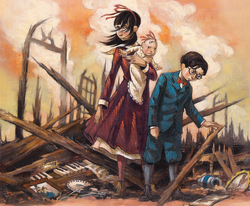
The Baudelaires feeling terrible and missing their parents very much.
The series focused on Violet, Klaus, and Sunny Baudelaire. Violet has a talent for inventing, Klaus has a talent for reading, and Sunny has a talent for biting. While they are portrayed very intelligent children, they are not perfect "superhumans" and have their own flaws. For example, Violet can overlook the obvious and doesn't know what leeches are, Klaus can be rude and doesn't know what a "xenophobe" means, etc. Sunny could be considered a superhuman to a degree, as she is a baby who has a sword fight with her teeth in the second book and climbs up an elevator shaft with her teeth in the sixth.
They become extremely unfortunate, unlucky and depressed children after their parents perish in a fire that destroys their entire home, going on to live lives full of sadness, stress, misfortune, misery, and woe.
The Baudelaires are soon brought to their (claimed) third cousin four times removed, the treacherous actor Count Olaf. However, the Baudelaires soon discover that Olaf is an abusive adoptive father and is after their inherited fortune which Violet will obtain when she turns 18. In addition, Olaf claims that once he finds a way to obtain their fortune, he won't hesitate to kill all three of them.

Lemony Snicket 12 Books in 120 Seconds
12 books in 120 seconds.
The main thirteen books of the series describe the treacheries that the children face through their young lives while trying to prevent Olaf and his many associates's attempts on getting his hands on the Baudelaire fortune, while trying to avoid death along the way while at the mercy of the world. Meanwhile, the Baudelaires must deal with absurd situations, a secret society known as V.F.D., and gullible and incompetent adults, many of which refuse to believe the Baudelaires and are unable to see through Olaf's disguises.
Dystopic elements
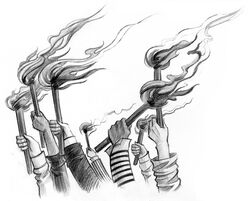
A mob of residents prepared to burn rulebreakers at the stake.
The world in the series often feels dystopic, hostile, corrupt, chaotic and cruel, leading many to call it a "crapsack world". However, it is set in a conventional setting without any war, famine, etc. The dystopic elements are often found in sociology, human behavior and often barbaric and nonsensical laws which humanity follows obediently and submissively.
For example:
- In Book One, it is mentioned that polygamy is illegal in the city the Baudelaires live in. While this isn't to say that this is indicative of a "dystopic" world, it could be considered a regression in human rights, as many people argue that consenting adult(s) should be able to marry as many people as they want.
- In Book One, when Olaf attempts to marry Violet with an official marriage certificate, Justice Strauss reluctantly accepts it and says, "I’m afraid this dreadful nonsense is the law" despite that it was a scheme in a play.
- In Book Four, a lumbermill pays its employees with chewing gum and coupons. (It is revealed in the TV series the employers are under hypnosis to accept this, and the entire mill is slave labor through mind control.)
- In Book Five, a baby is forced to become a school secretary because she is too young to attend a normal school, and none of the administration staff think this is absurd. Students are also forced to listen to Vice Principal Nero play the violin horridly for 6 hours each day and are forced to give Nero candy if they miss it.
- In Book Six, many people are interested in what's "in" and "out" (fashion) that it is often prioritized over functionality, and the Baudelaires can't use an elevator because elevators are "out", forcing them to walk up many flights of stories, although they later discover that sliding down the railing is faster.
- In Book Seven, there is a village that burns people to death if they don't follow its thousands of ridiculous and contradictory rules. They also advocate book burning. The majority of villagers are fine with this, and those who aren't like Hector are complacent and unwilling to try to change anything.
- In Book Seven, the world of the series is so crapsack that Hector intends to build a mobile home to last over a hundred years where he will spend the rest of his life away from human society, excluding the Baudelaires and Quagmires.
- In Book Eight, Heimlich Hospital is a hospital which, in the world of the series, naturally plays on real fears such as inadequate healthcare and medical malpractice.
- In Book Nine, there is a carnival audience which gathers just for the sole purpose of seeing people being mauled to death by lions.
- In Book Nine, when Violet attempts to use a phone to call for help during their emergency about how she and her siblings are lost, stranded in the hinterlands with no money and unsure what to do, and how they've been framed as murderers, the operator hangs up on her.
- A newspaper seen throughout the series, called The Daily Punctilio, is full of errors, inaccuracies, exaggerations, and distorts the truth.
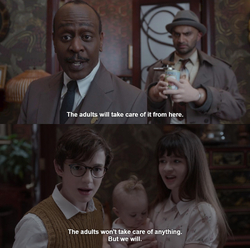
The series in a nutshell.
Many of the adults in the series often come across as severely flawed, such as being stupid, corrupt, incompetent, ignorant, delusional, psychopathic, lack common sense, overly pedantic, cannot make exceptions, follow rules too easily, vulnerable to peer pressure and follow mob/herd mentality, etc. In The Vile Village, the Baudelaires attempt to use "mob psychology" by shouting in a crowd, suggesting that humanity in the series is incapable of free independent thought.
Even if an adult is kind-hearted, they often have some other trait which negatively impacts the Baudelaires and endangers their lives, such as Josephine Anwhistle being cowardly.
It is unknown if the adults seen in the series are intended to be "average" in the world, or if the Baudelaires are simply unlucky when it comes to meeting decent people, as Lemony Snicket calls them magnets for misfortune.
The dismal psychology of humanity in the series even extends to children, such as Carmelita Spats and the students who bully the Baudelaires at school.
After The Vile Village, the Baudelaires' living situation changes drastically, essentially become homeless with an uncertain living situation as they seek food, shelter, and jobs wherever possible in order to survive.
Development
The author of the series, Daniel Handler (who uses the pseudonym Lemony Snicket), has said in an interview with The A.V. Club that he decided to write a children's story when he was trying to find a publisher for his first novel, The Basic Eight. One of the publishers, HarperCollins, passed on The Basic Eight, but they were interested in him writing a story for children. Handler thought it was a terrible idea at first, but met with the publishers to discuss the book. They challenged him to write the book he wished he could have read when he was 10.[1]
He retooled a manuscript he had for a mock-Gothic book for adults,[2] which became "the story of children growing through all these terrible things", a concept which the publishers liked, to Handler's surprise.[1]
When asked what inspired him to write the series, Handler said, "I thought it would be interesting if terrible things happened to three helpless children over and over again."[3]
Mature content

The Snicket Emergency
"The Snicket Emergency"
Despite that A Series of Unfortunate Events is often categorized as a "children's book series", there is a lot of questionable, disturbing, distressing, violent, and mature content in the series. Lemony Snicket warns the reader on each book cover that the Baudelaires' lives are unpleasant - there is no happy beginning, no happy end, and very happy things occur throughout the series.
Daniel Handler admits that he wrote the series because he was sick of how "sappy", "dumbed down" and "optimistic" children's books are, as they tend to always have happy endings, be overtly cheerful and uplifting, and give unrealistic expectations. Handler was inspired to write the series after watching news stories on TV about the lives of unfortunate children around the world.
In Lemony Snicket: The Unauthorized Autobiography, Lemony Snicket parodied a non-real series called The Luckiest Kids in the World! where three children are treated to a fun party, a big prize, a pony ride, several kind and sensible adults, and all the cake they can eat. The Littlest Elf is also a parody of these themes. In The Carnivorous Carnival, Lemony Snicket mentions a story called "The Story of Queen Debbie and Her Boyfriend, Tony":
| “ | The story of the Baudelaires does not take place in a fictional land where lollipops grow on trees and singing mice do all of the chores. The story of the Baudelaires takes place in a very real world, where some people are laughed at just because they have something wrong with them, and where children can find themselves all alone in the world, struggling to understand the sinister mystery that surrounds them. | ” |
— Lemony Snicket, The Carnivorous Carnival
|
Although there is no official minimum age rating on the series, recommendations are often 8/9/10+.[4] There are parents who read the series to their children as young as 6, which others argue is too young. Individual children have different levels of maturity. There is also no maximum age rating and even a 20, 50 or 100 year old can enjoy the series.
Throughout the series, the children encounter abuse (e.g. child abuse), death, murder, people dying in horrible ways, violence, horror, suffering, loss, pain, grief, misery and despair in a series of unfortunate events. The books also contain slight suggestive themes, mainly in Count Olaf's attempt to marry a 14-year-old Violet. Examples of mature content include (spoilers):
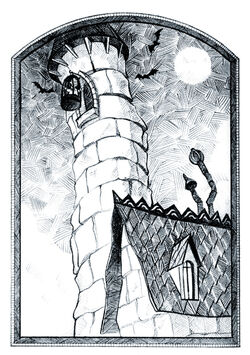
Sunny trapped in a bird cage.
- In The Bad Beginning, the Baudelaire parents supposedly burn to death in a fire. Child abuse is shown in Klaus being slapped across the face, and Sunny's mouth being duct-taped, having her body tied with rope and hung in a birdcage which Olaf threatens to drop. The book ends with Olaf telling Violet he intends to kill her and her siblings with his own two hands. There are also suggestive lines:
- When Count Olaf proposes his marriage play, there is this line: "Violet imagined sleeping beside Count Olaf, and waking up each morning to look at this terrible man."
- When Violet signs the marriage certificate, Count Olaf says, "Now, if all of you will excuse me, my bride and I need to go home for our wedding night."
- When Violet reveals she signed the document with her left hand, Count Olaf says to Violet, "You may not be my wife, but you are still my daughter, and-"
- In the film adaptation of The Bad Beginning, Count Olaf attempts to murder the Baudelaires by trapping them inside a car on train tracks.
- In The Reptile Room, Uncle Monty is poisoned to death. When Stephano attempts to kidnap the Baudelaires, he orders them to "get in the damn Jeep", and when the car doesn't run, he screams, "BLASTED FURNACES OF HELL!" It is also mentioned that during dinner, under the table, Stephano rubs the blade of his knife against Violet's knee during their entire meal, as a way to psychologically terrify her. The TV series adaptation even has a distressing close-up shot of Uncle Monty's dead body.
- In The Wide Window, the watcher/reader is led to believe that Aunt Josephine jumped to her death and drowned herself in a lake, with a suicide note about how she finds life unbearable. Although she survives that, Aunt Josephine is heavily implied to have drowned or eaten by leeches anyway.
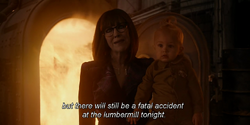
Georgina Orwell about to throw Sunny into a furnace.
- In The Miserable Mill, Charles is almost sawed to death, while Dr. Georgina Orwell actually is, and it is mentioned that later, the Baudelaires were still shuddering how she met her demise. In the TV adaptation, Sunny is almost thrown into a furnace, while Dr. Georgina Orwell actually burns to death in the furnace.
- In The Vile Village, both Jacques Snicket (Count Omar) and the Baudelaires are almost burned to death at the stake. Jacques ends up being mysteriously killed in his jail cell anyway.
- In The Hostile Hospital, Violet almost gets her head cut off, and much of the book involves Klaus and Sunny worrying about their sister being decapitated and murdered.
- In The Carnivorous Carnival, there is a pit of lions which maul two victims to death. The starving lions, who have been whipped so hard that their bodies have scars, perish in a fire.
- In The Grim Grotto, there are disturbing and terrifying descriptions of Sunny almost suffocating to death.
- In The Penultimate Peril, Dewey Denouement bleeds to death after a harpoon gun gores him in the stomach, and then proceeds to drown in a pond. Later, there is a hotel fire which probably killed many residents. The book ends with the implication that there are hundreds of people either burning to death or about to be burned to death.
- In The End, there are implications of an entire island being poisoned to death. The book also ends in quite a dark way, with the Baudelaires burying the bodies of Kit Snicket and Count Olaf. The series ends with the ambiguous possibility that the Baudelaires died after leaving the island.
Reception
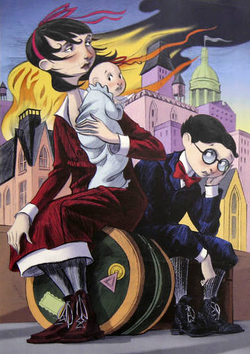
The Baudelaire orphans have become cultural icons of unfortunate children.
Reviews for A Series of Unfortunate Events have generally been positive, with reviewers saying that the series is enjoyable for children and adults alike, and that it brings fresh and adult themes to children's stories. Fans often claim the books are intelligently written, humorous, full of interesting plot twists, cliff hangers, complex characters, etc. The series can help teach children critical thinking, such as skepticism, and a wide variety of vocabulary.
In addition, the books may help to generate sympathy and understanding towards those who are unfortunate in life. For example, in The Austere Academy, the Baudelaires are forced to deal with bullying. The Times Online refer to the books as "a literary phenomenon", and discuss how the plight of the Baudelaire orphans helps children cope with loss—citing the rise in sales post September 11, 2001 as evidence.
However, the series has received its fair share of criticism. The series has also been criticized for formulaic and repetitive storytelling. Lemony Snicket constantly defines words, even ones such as "rickety", "blanched" and "simmered". Similar events occur repeatedly (the Baudelaires appear with a new guardian, Count Olaf appears in a disguise, no one believes the Baudelaires, someone is killed or almost killed, and Olaf escapes). When someone says something, "cried" is often used, such as "Violet cried, "It wasn't us!"
Handler appears to have taken this criticism seriously during development, as later books, definitions are moreso used in a fashion to describe the events that are unfolding, rather than the specific definition itself. Also, from Book 8 onwards, the Baudelaires go on-the-run.
Some claim and criticize that the books teach children to not trust adults and that it's useless to come to them for help, although another interpretation is that it teaches children to be wary of certain adults instead of all adults. A woman also once approached Daniel Handler and said, "In one of your books, you teach that it is sometimes necessary to lie."[5]
Controversy
The series has come under criticism from both parents and some school districts for its dark themes, citing objections to the suggested incest (referring to Olaf's attempt to marry his supposed distant cousin Violet in The Bad Beginning, although his motivation was not sexual in nature, but rather an attempt to gain the Baudelaire fortune) and the words "damn" and "hell" being said in The Reptile Room. Handler later commented that the word's use was "precipitated by a long discussion of how one should never say this word, since only a villain would do so vile a thing! This is exactly the lily-liveredness of children's books that I can't stand."
Since its release, access to the books have been banned and restricted in similar school districts; these include:
- Katy ISD Elementary School in Katy, Texas, due to having "violence/horror"[6]
- T.M. Clark Elementary in Portland, due to the extremely vague reason "mysticism"[6]
- Decatur, Georgia, due to Count Olaf attempting to marry Violet[7][8]
Religious controversy
The books have drawn the ire and praise of fundamentalist Christians, some of whom believe the books to be Christian allegories and some of whom believe them to be long insults against Christianity. Despite this, Handler, who is a secular humanist, claimed the books are not supposed to be Christian allegories or attacks on Christianity.[1]
The Baudelaire family have been confirmed to be of Jewish descent, although Violet, Klaus and Sunny do not mention deities or "God", implying ambivalence.
Some religious comparisons include:

VFD eye.
- Count Olaf has been seen as a parallel to Satan or some dark god-like figure. He is tall, has animalistic features that appear demonic, almost goat-like with his goatee and sideburns. He stalks the children mercilessly, is a psychopathic serial killer, and his eyes in his house make the children always seem like they are being watched. No matter where they go, he always seem to find them, implying omniscience. He is also involved with the secret society known as VFD. 666 can be seen in VFD's eye.
- In The Ersatz Elevator, the Baudelaires live at 667 Dark Avenue, which is one number away from 666.
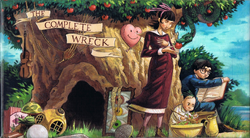
Violet receiving an apple from a serpent.
- In The End, Violet receives an apple which is a "cure" of a fatal disease from a snake, which could be interpreted as an allusion to Eve receiving the "fruit of knowledge" from the serpent. However, the islanders reject the apples.
When asked if A Series of Unfortunate Events is a "world without God", Handler replied, "God is not a character in A Series of Unfortunate Events. The narrator mentions at one point that the characters often felt as if there was something powerful over them, which made no move to help them and was perhaps even laughing at their misfortune. But whether that person was God or the author is up for grabs."[3]
Books
A Series of Unfortunate Events consists of thirteen novels:
- The Bad Beginning
- The Reptile Room
- The Wide Window
- The Miserable Mill
- The Austere Academy
- The Ersatz Elevator
- The Vile Village
- The Hostile Hospital
- The Carnivorous Carnival
- The Slippery Slope
- The Grim Grotto
- The Penultimate Peril
- The End
Releases and packaging
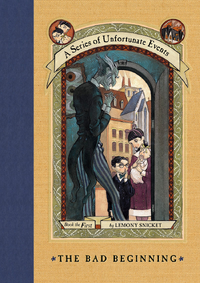
North American cover of The Bad Beginning.
The series carries a unique feel, not only in content, but also in packaging.
The original covers were made to look old fashioned, with Victorian designs throughout. They were originally released in paperback, but those have now become harder to find, with hardcovers becoming the standard for the series.
Several hardcover box sets were released in the US. The first four box sets came with three books each, and were each referred to as "A Box of Unfortunate Events." Books 1-3 were released as The Trouble Begins, books 4-6 were released as The Situation Worsens, books 1-6 were re-released as The Loathsome Library, books 7-9 were released as The Dilemma Deepens, and books 10-12 were released as The Gloom Looms. Shortly after publication of the last book, The End, the entire series was released in a box set called The Complete Wreck.
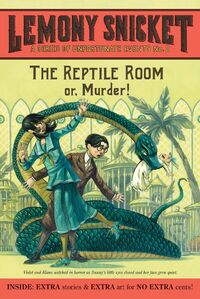
Penny Dreadful release of The Reptile Room: Or, Murder!
The series's illustrator Brett Helquist returned to illustrate another release of the series in paperback form, made to mimic the penny dreadful--a common nineteenth-century British publication that was usually released in parts, each of which cost a penny. Books one, two, and three saw releases in this form, as well as secondary names: The Bad Beginning or, Orphans!, The Reptile Room or, Murder!, and The Wide Window or, Disappearance! Penny Dreadful releases have been put on hold indefinitely for the remainder of the books.
Adaptations
There have been two major adaptations of A Series of Unfortunate Events: the Paramount film, and the Netflix series. Only the latter, which began in 2017, is considered "canon" and a valid source on this wiki, due to Handler's involvement and its mostly true-to-the-book depictions.
2004 film (non-canon)
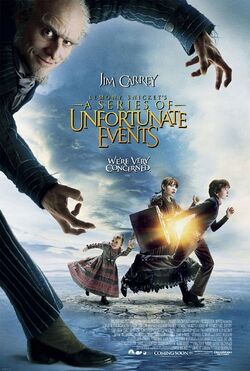
Film poster.
- Main article: Lemony Snicket's A Series of Unfortunate Events (film)
The first three novels of the series, The Bad Beginning, The Reptile Room, and The Wide Window, were made into a film, entitled Lemony Snicket's A Series of Unfortunate Events, and starring Emily Browning, Liam Aiken, and Jim Carrey.
Video game (non-canon)
The film was consequently adapted into a video game.
The game is based primarily on the movie, which in turn is based on the plots of the first three books of the series: The Bad Beginning, The Reptile Room, and The Wide Window.
Players take the roles of Violet, Klaus, and Sunny Baudelaire, solving puzzles, fighting villains and finding objects.
Television series
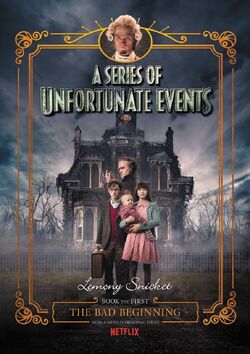
Netflix cover of The Bad Beginning.
- Main article: A Series of Unfortunate Events (TV series)
On January 13, 2017, Netflix released a TV series based on the books. Because of the canceled franchise of films, Lemony Snicket was reportedly happy with the idea, and had intentions to join production. He is one of the executive producers and a writer for the series, which, in the first season, contains eight episodes. Each book is broken up into two episodes, and season 1 adapts the first four in the series: The Bad Beginning, The Reptile Room, The Wide Window, and The Miserable Mill. A second season was renewed in March 2017, and it will cover the next five books: The Austere Academy, The Ersatz Elevator, The Vile Village, The Hostile Hospital, and The Carnivorous Carnival. It is expected to be released in early 2018.[9][10]
Directors of the series include Barry Sonnenfeld, Mark Palansky, and Bo Welch. Violet is played by Malina Weissman, Klaus by Louis Hynes, and Sunny by Presley Smith, while Sunny's voice is performed by Tara Strong.
Other works by Snicket, set in the VFD universe
All the Wrong Questions

- Main article: All the Wrong Questions
Starting in 2012, a new series by Snicket, set in the same VFD universe, began, entitled All the Wrong Questions. This new book series depicted the childhood of Lemony Snicket himself. In his adolescence, Snicket is new to VFD and is taken by his chaperone S. Theodora Markson to the town Stain'd-by-the-Sea, where he solves mysteries on his own and asks all the wrong questions.
Related works
- 13 Shocking Secrets You'll Wish You Never Knew About Lemony Snicket
- Lemony Snicket: The Unauthorized Autobiography
- The Beatrice Letters
- The Blank Book
- The Dismal Dinner (released by Lunchables)
- The Pessimistic Posters
- The Ponderous Postcards
- The Puzzling Puzzles
- The Notorious Notations
- The Tragic Treasury
External links
Sources
- ↑ 1.0 1.1 https://www.avclub.com/daniel-handler-1798208806
- ↑ https://www.salon.com/2000/08/17/snicket/
- ↑ 3.0 3.1 http://www.momentmag.com/jewish-secrets-lemony-snicket/
- ↑ https://www.commonsensemedia.org/book-reviews/the-bad-beginning-a-series-of-unfortunate-events-book-1
- ↑ https://www.npr.org/2017/01/13/509587895/the-man-behind-lemony-snicket-talks-about-writing-for-kids-and-his-childhood-fea
- ↑ 6.0 6.1 https://www.aclutx.org/en/publications/banned-books (see bb2k5.pdf & bb2k6.pdf)
- ↑ http://www.npr.org/2017/01/13/509587895/the-man-behind-lemony-snicket-talks-about-writing-for-kids-and-his-childhood-fea
- ↑ http://www.alsc.ala.org/blog/2014/07/danielhandler/
- ↑ Bui, Hoai-Tran (22 May 2016). Barry Sonnenfeld on ‘A Series of Unfortunate Events’ Season 2 [Interview]. /Film. Retrieved on 23 May 2017.
- ↑ http://www.etonline.com/tv/219418_nathan_fillion_more_join_season_2_of_a_series_of_unfortunate_events_find_out_who_they_re_playing
